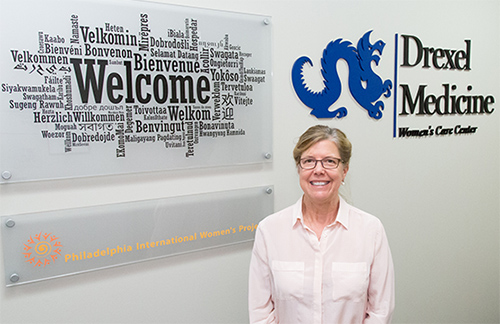
Sandra Wolf, MD
Director of the Women's Care Center
Associate Professor of Obstetrics & Gynecology
WHAT IS THE MISSION of the Women's Care Center?
The Women's Care Center provides comprehensive reproductive health care services, family planning, obstetrics and gynecology to underserved women in Philadelphia, particularly immigrants and refugees. Patients are increasingly diverse, as is Philadelphia. The center accepts all insurances and has robust safety-net programs for women who have no insurance or cannot afford their co-pays. Residency education is a key component, so trainees learn under the attending physicians. Peer outreach workers — women from the community who bring other women into the center — are an invaluable resource as well.
WHAT IS 'cultural humility'?
A more apt term than cultural sensitivity, cultural humility means maintaining curiosity and humility when working with patients from other cultures. For instance, if a patient comes from a culture where preventive medicine is not the norm — where one sees a doctor only when very sick — she might think a mammogram is not worthwhile. If we're not aware of that, we may think she's noncompliant, when she just has a different system of beliefs we need to work within. It's a whole host of sensitivities that really stem from the provider being cognizant of the patient's background. We also practice trauma-informed care, since newly arrived refugees often come from distressed parts of the world.
HOW DO YOU MEET THE NEEDS of immigrant women and refugees?
The Philadelphia International Women's Project is a collaboration between the College of Medicine; the African Family Health Organization, a community-based organization; and Nationalities Service Center, a refugee resettlement organization in Philadelphia. It offers a pathway to improve sexual and reproductive health outcomes in refugee and immigrant women. It is particularly focused on those who've undergone genital cutting, as well as sexual and gender-based violence that may be linked to it. Dr. Jasjit Beausang and I provide the medical expertise. The program is currently funded by a grant from the Office on Women's Health (womenshealth.gov).
We are one of very few sites in the United States providing this kind of community-based, comprehensive care. It's estimated that around 16,500 women in our region are affected by cutting. There's a lot of stigma and secrecy associated with it. Many women don't understand what was cut and what happened to them. So we answer a lot of questions.
For other women, cutting is not a seminal event in their lives. In that case, we don't treat it as a problem but will follow up with education. If the patient has female children, we will explore that a bit further — ask how she feels about cutting and really counsel her. If she thinks her child is at risk and she has no control, which many women don't, then we'll let her know she has resources. It's delicate. We don't want to stigmatize somebody further. Also, since many of these women had terrible experiences with health care providers, we offer training to clinicians and other providers in giving culturally competent care. We've reached nearly a thousand providers in three years. Our research has shown that because of the huge African immigration into Philadelphia since the 1990s, clinicians were already seeing these women; they just had no training or background to provide adequate care.
WHAT DO YOU ENJOY MOST about your work?
The work is meaningful and rewarding. You learn about cultures' beliefs. You learn resilience. You make connections to community members who come in with their friends. You get a community-based view of health and a global-based view of health, mixed together. You meet unique people. So it's gratifying. I have good department and University support. Both are needed to keep grant-making going, to ensure safety nets are in place so we can reach vulnerable populations and take care of them.